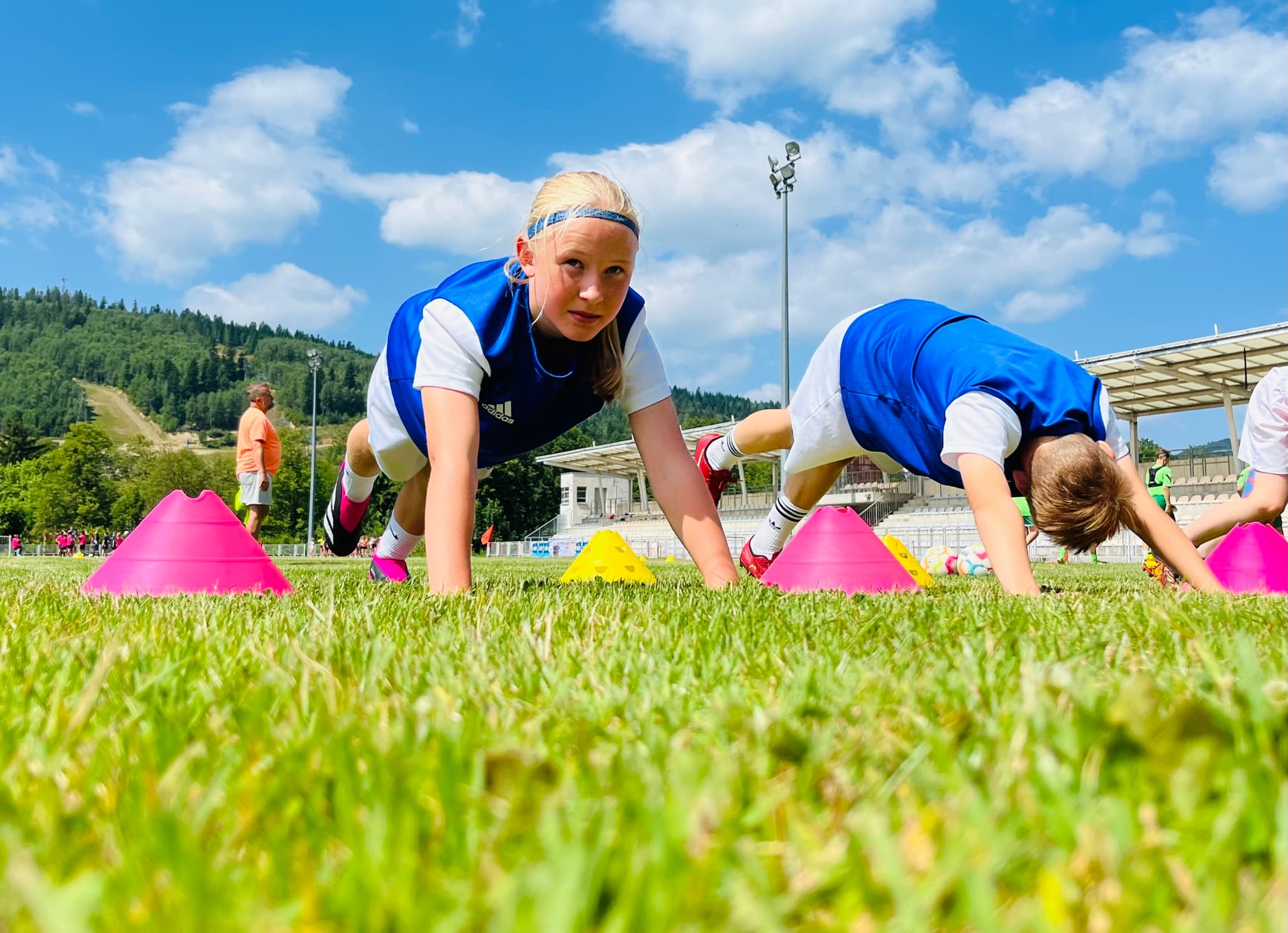Przewodnik dla Początkujących: Jak Rozpocząć Swoją Piłkarską Przygodę

1. Poznaj Podstawy
Zanim wejdziesz na boisko, warto zrozumieć podstawowe zasady piłki nożnej.
Oglądaj mecze na żywo lub online, aby lepiej zrozumieć zasady, pozycje na boisku i strategie gry.
2. Co Jest Potrzebne, Aby Zacząć Grać w Piłkę Nożną?
Niezbędny sprzęt do gry w piłkę nożną to korki, piłka i odzież sportowa.
Nie musisz od razu inwestować w drogie akcesoria; ważne jest, aby były wygodne i odpowiednie do wybranej nawierzchni.
Na pierwsze treningi możesz zabrać zwykłe buty sportowe, koszulkę i szorty.
Trener na pewno powie Ci, jakie buty są potrzebne (tak, są różne rodzaje popularnych "korków"), a często zamówisz swój strój w nowym klubie. Logo klubu i członkostwo w nowej grupie czekają na Ciebie.
3. Gdzie Grać w Piłkę Nożną?
Zacznij od znalezienia lokalnych boisk, parków lub innych miejsc, gdzie możesz trenować i grać swobodnie.
Wiele miast oferuje otwarte boiska dostępne dla publiczności.
Jako mama nie powinnam tego pisać, ale możesz nawet trenować w domu!
Wystarczy trochę miejsca i piłka, aby ćwiczyć sztuczki.
4. Dołącz do Grupy lub Drużyny
Szukaj lokalnych klubów, szkółek piłkarskich lub grup na mediach społecznościowych.
Dołączenie do zorganizowanej grupy pomoże Ci nie tylko lepiej poznać grę, ale także poznać nowych ludzi.
Zdjęcia dostarczone przez PAF Sport Future, dziękujemy
5. Ćwiczenia i Trening
Zacznij od prostych ćwiczeń, takich jak drybling, podania czy strzały na bramkę.
Regularne treningi są kluczem do poprawy umiejętności i kondycji fizycznej.
6. W Jakim Wieku Rozpocząć Treningi Piłkarskie?
Czas na profesjonalne treningi to około 10-11 lat. Jednak wiele ogólnorozwojowych zajęć i pierwsze gry z piłką to świetne miejsce nawet dla 3-latków. Dzieci mogą rozwijać umiejętności motoryczne, łapać, kopać piłkę, biegać, skakać, wspinać się, wszystkie te gry są kluczową podstawą do dalszej praktyki sportowej.
7. Ucz się od Innych
Nie bój się pytać o wskazówki bardziej doświadczonych graczy. Obserwowanie innych i
otrzymywanie konstruktywnej krytyki może znacznie przyspieszyć Twój rozwój.
Świetnym sposobem na poznanie nowych graczy i trenerów są obozy sportowe, sprawdź ofertę i dowiedz się więcej, zarówno 7-latkowie, jak i bardziej doświadczeni młodzi mogą wziąć udział w obozie.
8. Wyznaczaj Cele
Wyznaczaj małe, osiągalne cele, takie jak nauka nowej sztuczki, poprawa szybkości biegu, czy udział w lokalnym turnieju. To pomoże Ci utrzymać motywację i poczuć postęp.
9. Zdrowie i Kondycja
Pamiętaj o znaczeniu dobrej diety i odpowiedniej ilości snu. Zdrowy styl życia jest niezbędny, aby być w najlepszej formie na boisku.
10. Cierpliwość i Wytrwałość
Rozwijanie umiejętności piłkarskich wymaga czasu i cierpliwości. Nie zniechęcaj się początkowymi trudnościami – każdy wielki gracz zaczynał od podstaw.
Najważniejsze! Baw się dobrze Przede wszystkim pamiętaj, że piłka nożna to gra, którą należy się cieszyć. Ciesz się każdym meczem, treningiem i postępem, jaki osiągniesz na swojej piłkarskiej ścieżce.
Najważniejsze! Baw się dobrze
Przede wszystkim pamiętaj, że piłka nożna to gra, którą należy się cieszyć. Ciesz się każdym meczem, treningiem i postępem, jaki osiągniesz na swojej piłkarskiej ścieżce.
Przeczytaj także, Czy Dziewczyny Mogą Grać w Piłkę Nożną?
Rozpoczynając swoją piłkarską przygodę, pamiętaj, że najważniejsze są nastawienie, zaangażowanie i chęć nauki. Niezależnie od tego, czy marzysz o profesjonalnej karierze, czy szukasz nowego hobby, piłka nożna to świetny sport.

